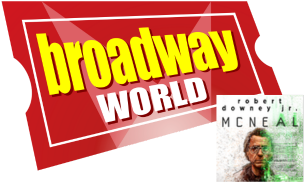The Broadway Musical Is Changing Its Key - nytimes.com
Joined: 12/31/69
#25re: The Broadway Musical Is Changing Its Key - nytimes.com
Posted: 12/27/03 at 8:05pm
Weber's article is misleading. Shaiman never said "all he cared to do was entertain". What Shaiman said is that it must also be entertaining. Who couldn't see that in his comment?
I was bothered by the fact that Weber says "Shaiman borrows an idiom from the early 60's, when the show is set". Weber's comment is set up in a careless way that makes readers think Shaiman didn't have an original idea, melody or groove. The Hairspray score is ORIGINAL. Whether you like the score or not, it's O-R-I-G-I-N-A-L. Mr. Weber, Hairspray takes place in 1962, as you said. What period should Shaiman have written in? And Mr. Weber, while I see the point of your article, I thought it was reckless journalism.
I thought Jack O'Brien's comments were most profound.
Good for Marc Shaiman for speaking up about that article.....Oh and Marc, when scoring "To Catch A Thief", be careful not use too many odd time signatures. Weber might suggest that you stole from Burt Bacharach.
broadwayguy2
Broadway Legend Joined: 5/18/03
#26re: re: The Broadway Musical Is Changing Its Key - nytimes.com
Posted: 12/27/03 at 8:08pmI agree.... Shaiman never said that was his only intent, but a good show SHOULD entertain......... if a score is original, complex, etc, but does not grab you and entertain, it is pointless.
Broadway Legend Joined: 12/31/69
#27re: re: re: The Broadway Musical Is Changing Its Key - nytimes.com
Posted: 12/27/03 at 8:11pmBROADWAYGUY2 - I couldn't agree with you more.
MusicMan
Broadway Legend Joined: 5/16/03
#28re: re: re: re: The Broadway Musical Is Changing Its Key - nytimes.com
Posted: 12/28/03 at 5:47pm
Bullseye, Bulldog, as usual.
I also agree with you MisterMatt. The article is uninsightful and typical of the increasingly lackluster arts coverage in the Times (and the dialogue between Brantley and Weber in the year-end wrap-up is even worse: Brantley now shamefully passes off Frank Rich's pretentious nonsense about the CAROLINE OR CHANGE score as his own, hilariously dubbing the dreary and inert recitative that passes for a score a "collage" and drawing lunatic parallels with PORGY AND BESS--what did Gershwin ever do to Brantley?).
First off, the assumption in the article that theater music and pop music have always been synonymous has to be clarified. True, there was a greater kinship between the two in the last century than there is in the present one. However, theater music has ALWAYS had a more elevated, elegant and "created" quality that distinguish it from pop songs. That's what makes it theatrical. Take most pop songs from the period and stack them up against show tunes and the latter will inevitably trump the former in terms of musical and lyrical sophistication and "size.". Just as drama is crystallized and heightened life, so a theater song must be pointedly crafted and stylized to communicate its ideas across the footlights.
Weber seems to think a lack of contemporary scores is Broadway's problem, as if contemporaneity were in itself a virtue. (By Weber's own criteria, AVENUE Q's pastiche of Sesame Street tinker-toy tunes hardly qualify it as "contemporary" or "original," despite his praise--it's as rooted in a 70's idiom as WICKED's score.) The static, repetitive and rhythmically-driven qualities of most contemporary pop music, not to mention its often trite and inherently adolescent character, render it useless in illuminating adult characters and narrative and communicating more subtle and sophisticated emotions than the whiny, navel-gazing or parodistic kind. True, rap was put to brilliant use in THE BOMB-ITTY OF ERRORS, for my money, the best "musical" of its year. But for a full-length Broadway show?
To make my point using another medium, Chaplin's MODERN TIMES, a silent, was an anachronism when it appeared in 1936. And yet, thanks to its brilliantly comic set-pieces, it continues to appear on critics' "best of" lists around the world, whereas more au courant sound offerings from the same year have crumbled to so much powder. In the end, the problem is not the mode of expression but the quality of expression and its ability to communicate that counts. As Ellington said, "There's only good or bad music." And, good music, as Bernstein remarked, has that "fresh, yet inevitable" quality that renders it timeless. As I wrote earlier, if all of TABOO's score had the dramatic and musical power of Talk Amongst Yourselves, you'd have a very interesting show. But the rest of it is recycled pap or wildly inappropriate in tone or simply inept and tasteless. Conversely, the Guettel-LaChiusa-Gordon, etc. camp may have a more "sophisticated" musical vocabulary at their disposal but lack the gifts to connect effectively with audiences in a populist medium. What Broadway lacks is the musical dramatist who has something to say in "fresh, yet inevitable" ways and is not afraid to communicate directly and openly with the audience. A tall order in these tough, economic times? Perhaps. But the "Fabulous Invalid" has had them before and will have them again.
Updated On: 12/28/03 at 05:47 PM
Videos
